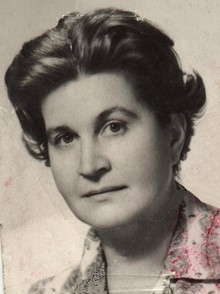Helena Rasiowa (1917-1994) was a mathematician and logician whose work made an essential impact on mathematical logic, and also on a new field emerging in the 1960s: logic in computer science.
Helena Rasiowa’s academic initiation happened in dreadful times. The outbreak of World War II cut off her mathematical studies just started at the University of Warsaw. She nevertheless succeeded to complete her studies during the war, at the clandestine university, and prepared a Master thesis under the supervision of Jan Łukasiewicz and Bolesław Sobociński. But the manuscript was lost during the total destruction of the city in 1944, while Helena herself barely saved her life. After the war, she first worked as a teacher in school, where she was found by Andrzej Mostowski and came back to the university. She reconstructed her Master’s thesis and in 1947 her first publications (in French) appeared in scientific journals.
She then developed her remarkably original path in research subsumed in the celebrated book written with Roman Sikorski and published in 1963: Mathematics of Metamathematics.
The authors argue that mathematical logic takes a great advantage of a full strength of abstract mathematics—not only arithmetics, but also topology and algebra. As an impressive example, a completeness theorem for intuitionistic logic has been obtained via the Baire category theorem for topological spaces. The approach proved to be fruitful when met with challenges of computer science — the work of Rasiowa and her students influenced significantly an early development of logic of programs and logic in artificial intelligence.
Professor Rasiowa devoted much of her time and energy to serving academic community in many ways. She gave her heart to the University of Warsaw, where she assumed numerous responsibilities, in particular as Dean of the Faculty. A scholar of worldwide reputation, she also served in international associations, and in particular in the Stefan Banach Mathematical Center in Warsaw that for several decades was a meeting place of mathematicians from East and West. The times in which she lived and worked were never quiet: marked by cold war, political pressures, and restriction in scientific communication. But it was her maxim that in abnormal times one should–as much as possible–live normally. Her energy, firmness, and smile were a continuous encouragement for her academic colleagues and students.
Helena Rasiowa was a dedicated teacher. For uncounted generations of students in Poland, their first mathematical textbook was Rasiowa’s Introduction to modern mathematics (later translated to English). She educated a great number of young researchers in mathematical logic, foundations of mathematics, and theoretical computer science. She gave their students an invaluable inspiration and help, at the same time leaving space for their own creativity. Professor Rasiowa supervised more than 20 PhD students, most of whom have become themselves renowned researchers.
(Text: Damian Niwinski)

(Foto from wikipedia – fair use, “Non-profit educational”)
